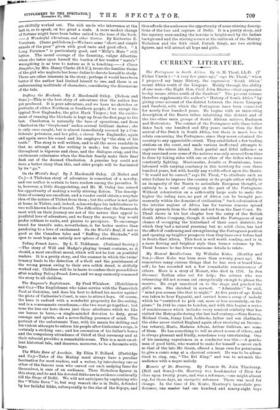CURRENT LITERATURE.
The Portuguese in South Africa. By G. M. Theal, LL.D. (T
Fisher Unwin )---" A very few years ago," says Dr. Theal, " when I prepared my large History, the expression South Africa' meant Africa south of the Limpopo. Mainly through the ability of one man—the Right Hon. Cecil John Rhodes—that expression to-day means Africa south of the Zambesi." The present volume therefore supplements the author's " History of South Africa" by giving some account of the district between the rivers Limpopo and Zambesi, with which the Portuguese have been connected for nearly four hundred years. He begins with an interesting description of the Bantu tribes inhabiting this district, and of the two other main groups of South African natives, Bushmen and Hottentots. The contact of the Portuguese with these tribes dates back one hundred and fifty years earlier than the first arrival of the Dutch in South Africa, but there is much less to relate concerning the Portuguese, since they never colonised the country to any appreciable extent. They established a few trading stations on the coast, and made various ineffectual attempts to capture the mines inland. Such partial and fitful influence as they exercised over some of the natives was only secured from time to time by taking sides with one or other of the tribes who were constantly fighting. Missionaries, Jesuits or Dominicans, have laboured with varying constancy in this territory for over three hundred years, but with hardly any visible effect upon the Bantu. " It would not be correct," says Dr. Theal, "to attribute such an utter failure to improve the country or its people either wholly to an incapacity of the Bantu to assimilate European thought, or entirely to a want of energy on the part of the Portuguese. Without colonisation on a sufficiently large scale to make the higher the ruling race, no part of Africa can be brought per- manently within the domains of civilisation." Such colonisation of the interior regions of Africa has for various reasons spread slowly upwards from the South and not from the East Coast. Dr. Theal shows in his last chapter how the entry of the British South Africa Company, though it robbed the Portuguese of any chance of occupying the hinterland of their coast districts, for which they had a natural yearning but no solid claim, has had the effect of confirming and strengthening the Portuguese position and opening up brighter prospects than they have ever before had in South-East Africa. This book is well worth reading, and is in a more flowing and brighter style than former volumes by Dr. Theal because he has fewer wearisome details to relate.






















































 Previous page
Previous page